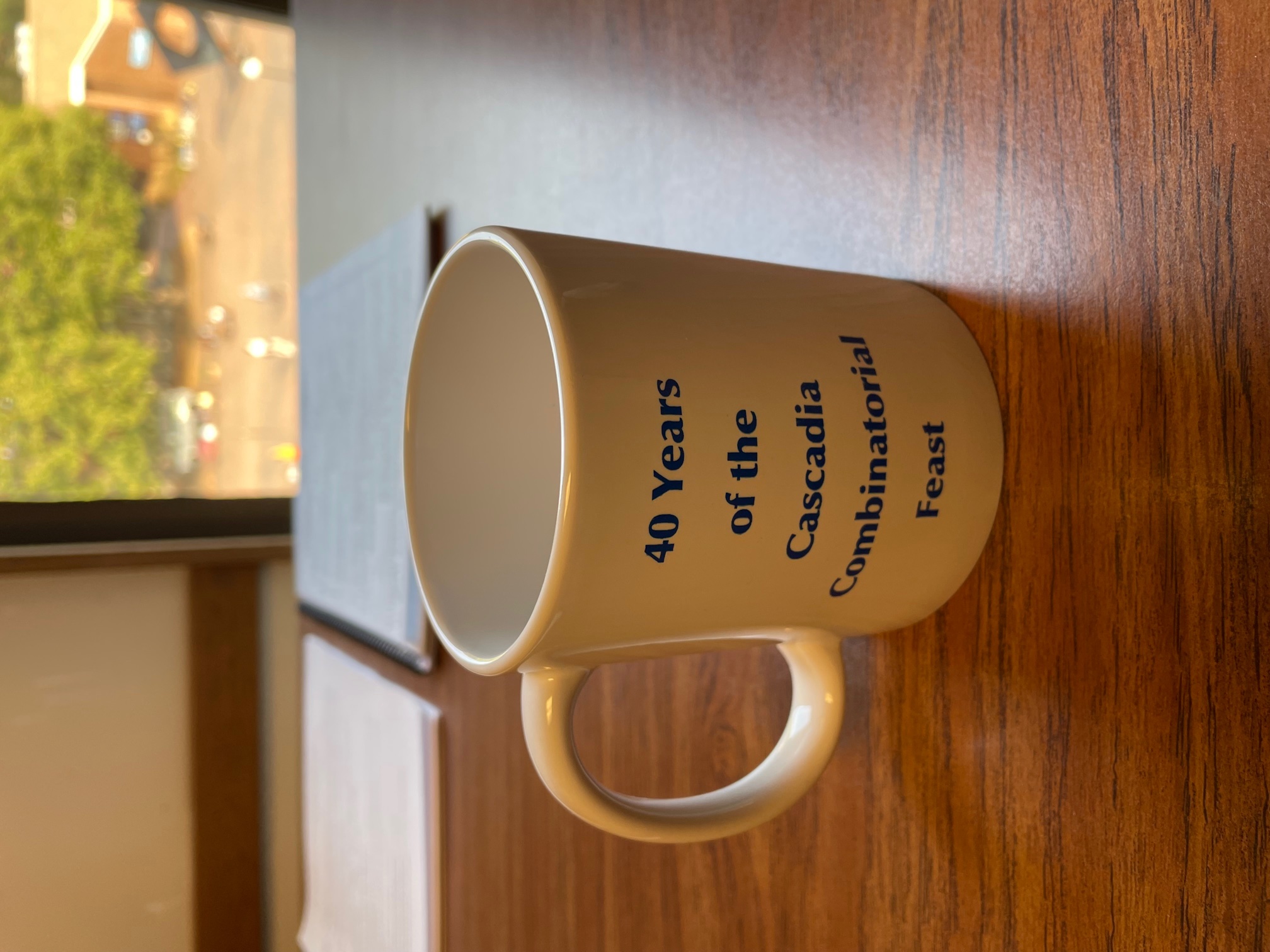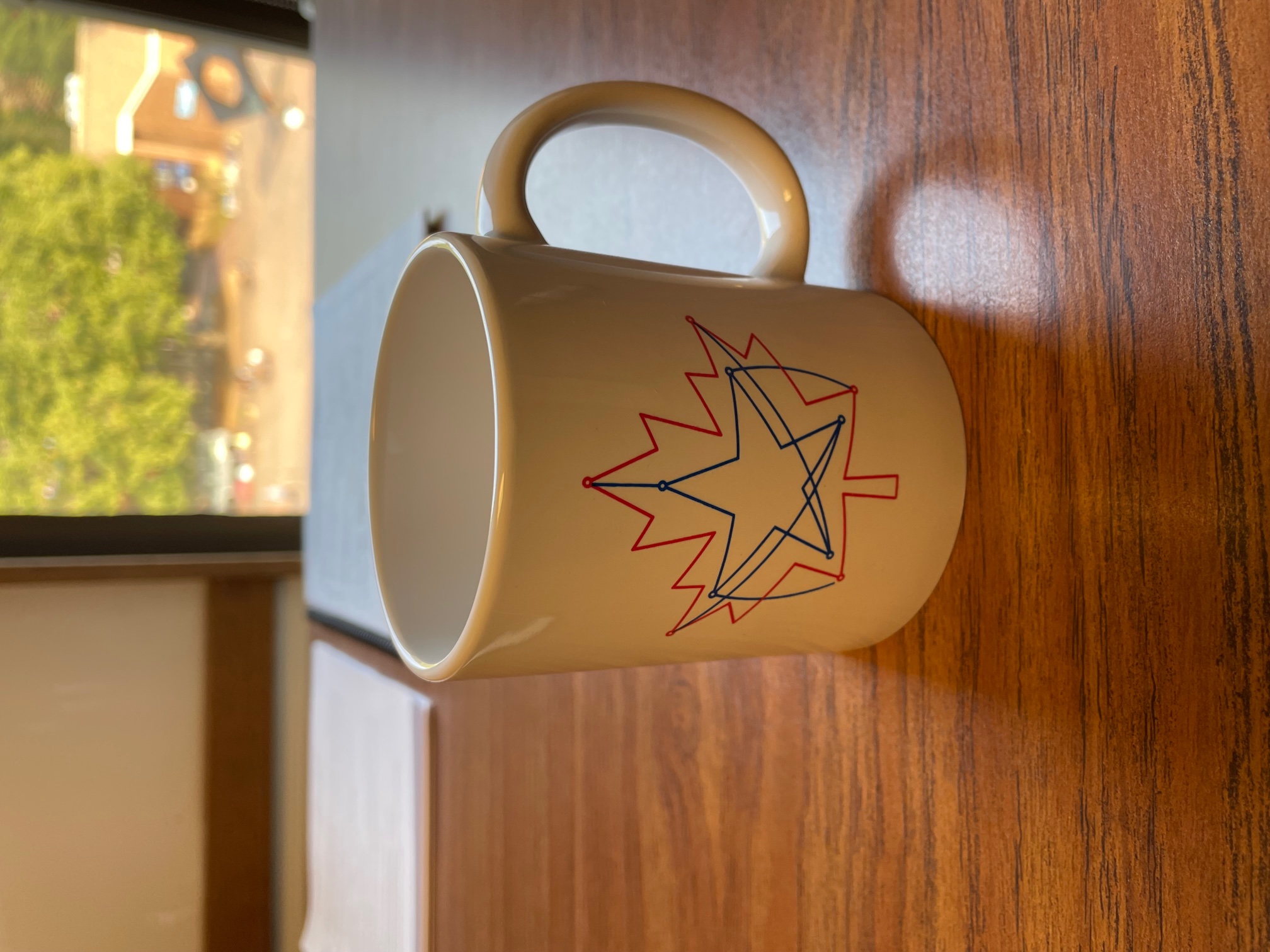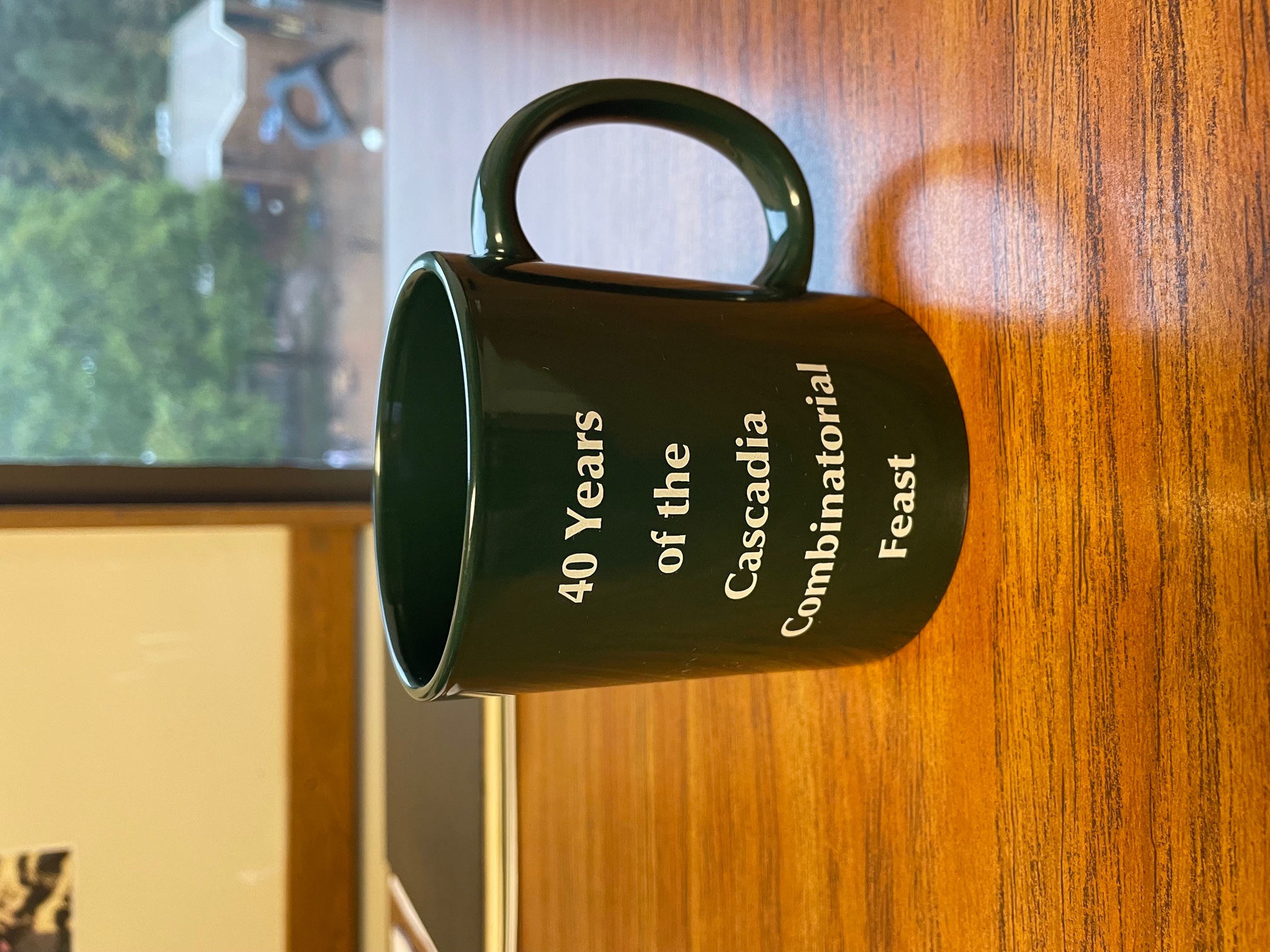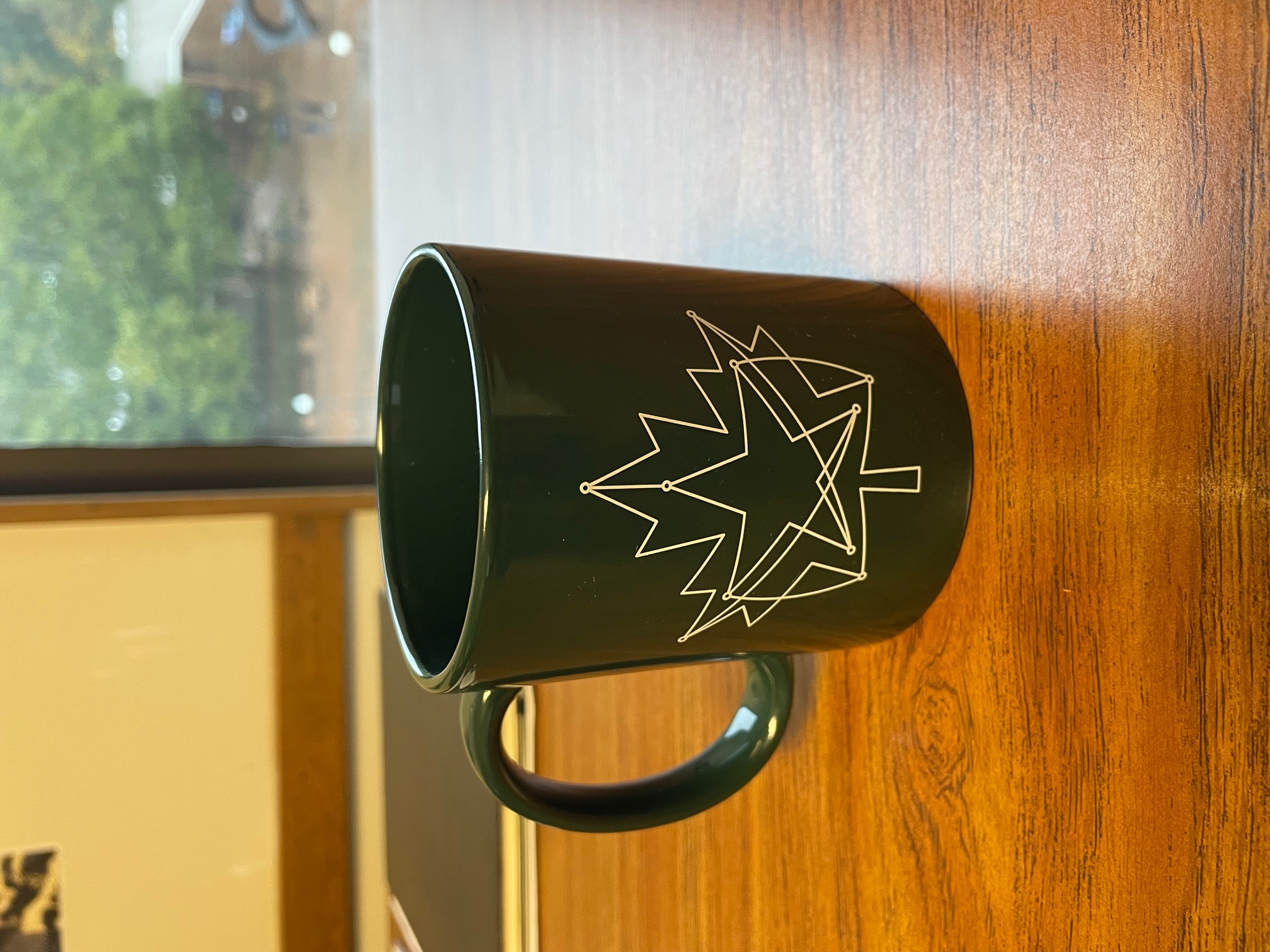
Cascadia Combinatorial Feast 2024
Beezerpalooza Edition
University of Puget Sound
April 26-28, 2024
About the Cascadia Combinatorial Feast
The Cascadia Combinatorial Feast (formerly known as the Combinatorial Potlatch) is an annual, floating, one-day conference. It has been held for many years at various locations around Puget Sound and southern British Columbia, and is an opportunity for combinatorialists in the region to gather informally for a day of invited talks and conversation. While most who attend work in, or near, the Puget Sound basin, all are welcome. Typically there are three talks given by speakers who are visiting or new to the area, along with breaks for coffee and lunch. Many participants remain for dinner at a local restaurant or pub.
In 2020, we decided to change the name of the conference. The original name, Potlatch, referred to a ceremonial feast among certain First Nations of the northwest Pacific coast. You can read more about Potlatches here.
The 2024 conference will be hosted in person by the Department of Mathematics at the University of Puget Sound in Tacoma, Washington from Friday through Sunday, April 26-28, 2024. It will be the Beezerpalooza edition: a celebration of the career of Rob Beezer.
Significant funding is being provided by the Pacific Institute for the Mathematical Sciences and the Coast Combinatorics Conference fund. Their support is gratefully acknowledged.
More information, including a history and links to previous conferences, is at the Cascadia Combinatorial Feast Home Page.
For Remote Participants
The Zoom Meeting ID is 896 7991 3685.
The password has been sent to everyone on our mailing list, and can also be obtained by emailing Jane Butterfield (jvbutter (a) uvic (dot) ca).
Schedule
The reception and all the talks will be held in the Tahoma Room in Thomas Hall. See the Getting There section for exact locations and directions.
See the Social Events section for more information on the lunches and happy hour.A tentative schedule follows.
Friday
7:00 PM Reception on campus with heavy hors d'oeuvers
Saturday
10:00 AM Coffee, pastries and bagels11:00 AM Opening remarks
11:10 AM Christine Kelley: Decoding failures of quantum graph-based codes
12:15 PM Lunch at Katie Downs
2:30 PM David Farmer: An unauthorized and inaccurate history of PreTeXt
3:00 PM Zoom session with remote remarks
3:15 PM Cookies and coffee
3:45 PM Andy Zimmer: Counting in terms of eigenvalues
4:25 PM Remarks from Rob's former students
5:00 PM Happy hour and Dinner at E9 Firehouse
Sunday
9:30 AM Coffee, pastries and bagels10:40 AM Dylan Poulsen: PreTeXt in Probability courses (remote talk)
11:00 AM Zoom session with remote remarks
11:40 AM Sam Vandervelde: Riddle of the dots
12:05 PM Gary MacGillivray: Switching $m$-edge coloured graphs
12:30 PM Closing remarks
1:00 PM Lunch at Dukes Seafood
Talks and Abstracts
David Farmer, American Institute of Mathematics
An unauthorized and inaccurate history of PreTeXt
Rob Beezer is the creator and lead developer of PreTeXt: the authoring language which will supplant LaTeX for writing documents in math and (eventually) all areas of scholarly communication. How did Rob think of the idea of PreTeXt? What was he doing that prepared him to take on this monumental task? What were the major milestones to get where we are today? Rob may or may not agree with the answers given in this talk.
Christine Kelley, University of Nebraska-Lincoln
Decoding failures of quantum graph-based codes
Codes based on sparse parity check matrices, known as low density parity check (LDPC) codes, are known for their remarkable performance and low complexity decoding. Quantum LDPC (QLDPC) codes are currently the best candidates for realizing fault tolerant quantum computation. Like their classical counterparts, failure of iterative decoding of QLDPC codes depends on structures in the corresponding sparse graph representation. In this talk, we will give a basic overview of graph-based codes, and syndrome-based iterative decoding, and present come results on graph structures that cause different types of decoding failure in QLDPC codes. This is joint work with Kirsten Morris and Tefjol Pllaha.
Gary MacGillivray, University of Victoria
Switching $m$-edge coloured graphs
An $m$-edge-coloured graph consists of a graph $G$ and a function that assigns each edge of $G$ one of $m$ colours. Edges incident with the same vertex can be assigned the same colour. Let $\Gamma$ be a group of permutations of the set of colours. The operation of switching at a vertex $v$ of $G$ with respect to $\pi\in\Gamma$ permutes the colours of the edges incident with $v$ according to $\pi$. Two labelled $m$-edge coloured graphs $G$ and $H$ are $\Gamma$-switch equivalent if there is a sequence of switches that transforms $G$ into $H$. $\Gamma$-switch equivalence is an equivalence relation on the set of $m$-edge-coloured graphs. For groups $\Gamma$ that act transitively on the colour set we determine the number of equivalence classes, and describe an efficient algorithm for deciding whether two $m$-edge coloured graphs are $\Gamma$-switch equivalent.
Dylan Poulsen, Washington College
Authoring a PreTeXt book as a semester-long class project in probability theory
As a student of Rob Beezer, I learned the most from final projects in which I researched a topic and wrote about it to an audience of my peers. When rethinking how to teach Probability Theory to a small class in the first semester back in-person, my thoughts turned to these projects and their impact on my learning. I envisioned a class with a single goal - writing a Probability Theory textbook for students, by students. This talk will outline my inspiration, my course design, the execution, and a discussion of the pros and cons of the approach.
Sam Vandervelde, Proof School
Riddle of the dots
By comparing a standard $q$-binomial identity with MacMahon's generating function for plane partitions, we are led on a merry search for a bijection between plane partitions and certain "cascading dot configurations." The discovery of the desired bijection illuminates the structure of plane partitions and indicates how each is associated, via RSK, with a particular permutation. Among other things, this perspective allows us to interpret coefficients in the expansion of $\prod_{n=1}^{\infty} (1-zq^n)^{-n}$.
Andy Zimmer, University of Wisconsin-Madison
Counting in terms of eigenvalues
Many years ago, as an undergraduate student, I learned group theory and linear algebra from Rob Beezer. In this talk, I will discuss some of my research involving these subjects and in particular will describe some recent joint work with Blayac, Canary, and Zhu which counts the number elements with eigenvalues of a certain size in certain types of discrete groups of matrices.
Registration
The Cascadia Combinatorial Feast has no registration fees. And we like it that way. The host institutions provide facilities, coffee and food for the breaks, and some support for speakers' travel.
IMPORTANT: To help us with numbers, if you plan to attend the conference, please email Cynthia Gibson (cgibson (a) pugetsound (dot) edu), and indicate which of the social events you (and your guests, if any) plan to attend.
Getting There
Getting to Campus from the North
From I-5 South, take exit 133, Interstate 705 north, City Center exit. Exit at Schuster Parkway. Continue for approximately one mile, and stay to the left. Exit to the left (Schuster Parkway), and follow Schuster along the water. Stay to the right and proceed approximately 1.5 miles. Exit right onto North 30th. Continue through the traffic signal in Old Town and up the hill. Continue on 30th past the blinking light at North Alder. Turn left on Union Ave. Continue approximately one mile. The campus will be on your left. Parking is available in the Thompson Hall parking lot, marked P4 on the printable campus map. (Other close parking lots are off North 11th Ave marked P2 and P3 on the printable campus map.)
Getting to Campus from the South
From I-5 North, take exit 132 and stay in the right lane. Take the exit marked for Downtown Tacoma and Interstate 705 North, then continue following the signs for 705 North, City Center. Exit at Schuster Parkway. Continue for approximately one mile, and stay to the left. Exit to the left (Schuster Parkway), and follow Schuster along the water. Stay to the right and proceed approximately 1.5 miles. Exit right onto North 30th. Continue through the traffic signal in Old Town and up the hill. Continue on 30th past the blinking light at North Alder. Turn left on Union Ave. Continue approximately one mile. The campus will be on your left. Parking is available in the Thompson Hall parking lot, marked P4 on the prinatable campus map. (Other close parking lots are off North 11th Ave marked P2 and P3 on the printable campus map.)
Lodging
We have arranged a discounted rate at the Silver Cloud Tacoma Waterfront for the nights of April 26 and 27. (Note: the Silver Cloud Tacoma at Point Ruston Waterfront is a different hotel!)
The discount is \$10 off the best available rate at the time of reservation and based on availability. To get this rate, you can either call the hotel directly at 253 272 1300 and reference Cascadia Combinatorial Feast, or go to the hotel website and
- Enter the requested dates and click Check Availability
- Click Group Login (top left corner)
- Enter CASCADIA for the group code and CASCADIA for the password (case sensitive)
- Click Check Availability
Nearby Hotels (from the University of Puget Sound)
Mugs
We still have a few of these left! They are free. First come, first served.
The logo was designed by Cobus Swarts, and the cost of the mugs was shared by the Coast Combinatorics Conference fund and the Department of Mathematics at Western Washington University.
 |
 |
 |
 |
Social Events
We've made reservations for no-host lunches on Saturday and Sunday, and no-host happy hour on Saturday, at three local restaurants. There will also be a reception on campus on Friday evening. We very much hope you can join other participants at these events, and your guests are welcome to join us also.
Reception on Friday (7pm): Tahoma Room, Thomas Hall, UPS Campus
Lunch on Saturday (12:15pm): Katie Downs, 3211 Ruston Way
Happy Hour on Saturday (5pm): E9 Firehouse, 611 N Pine Street
Lunch on Sunday (1pm): Dukes Seafood, 3327 Ruston Way
Organizers
- Jane Butterfield, University of Victoria, jvbutter (at) uvic (dot) ca
- Cynthia Gibson, University of Puget Sound, cgibson (at) pugetsound (dot) edu
- Christine Kelley, University of Nebraska-Lincoln, ckelley2 (at) unl (dot) edu
- David Neel, Seattle University, neeld (at) seattleu (dot) edu
- Nancy Ann Neudauer, Pacific University, nancy (at) pacificu (dot) edu
- Amites Sarkar, Western Washington University, amites (dot) sarkar (at) wwu (dot) edu